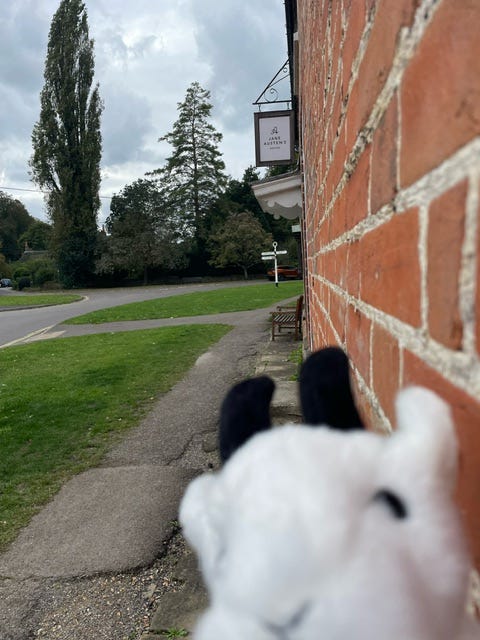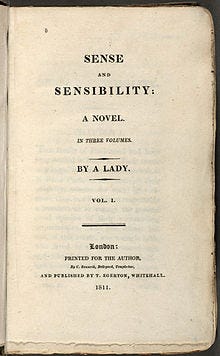Jane Austen has been voted The Bleating Goat Readers’ Greatest UK Novelist of all Time. Jane garnered 44% of the votes cast, comfortably ahead of Charles Dickens with 29%, then George Eliot and Thomas Hardy trailing with 12% and Joseph Conrad with a paltry 3%.
Jane wins the coveted Bleating Goat Trophy, which paid a visit to Jane’s house in nearby Chawton before being put in the post to the Jane Austen Society:
outside the House..
on Jane’s writing table…
(Note the very small size of Jane’s writing table, positioned in a light room with views out into the village.)
I have written to the Jane Austen Society enclosing her goat prize and will report back on their response.
Jane only published six novels, in a short period between 1811 and 1817. She was moderately successful in her lifetime though she was not famous - I can’t think why, could it be something to do with not actually putting her name on the books she published?
I can still remember the shock of reading Pride and Prejudice as a schoolboy. Shocked because I found I could understand it, shocked because I enjoyed it, and shocked that I recognised her characters, observations and irony - this spinster living quietly in a Hampshire country village in the early nineteenth century had connected with a 14 year old Essex schoolboy in the 1980s. It was a sudden realisation for me of the universality of the human condition and consequently (and I appreciate this may not be a normal reaction) a depressing insight into my own insignificance and mortality.
Rather than me witter on let’s hear what others thought of her.
“I often want to criticise Jane Austen, but her books madden me so that I can’t conceal my frenzy from the reader; and therefore I have to stop every time I begin. Every time I read ‘Pride and Prejudice’ I want to dig her up and beat her over the skull with her own shin-bone” - Mark Twain
“I read [Emma] with interest and with just the degree of admiration which Miss Austen herself would have thought sensible and suitable- anything like warmth or enthusiasm, anything energetic, poignant, heart-felt, is utterly out of place in commending these works: all such demonstration the authoress would have met with a well-bred sneer, would have calmly scorned as outre and extravagant. She does her business of delineating the surface of the lives of genteel English people curiously well; there is a Chinese fidelity, a miniature delicacy in the painting: she ruffles her reader by nothing vehement, disturbs him by nothing profound: the Passions are perfectly unknown to her; she rejects even a speaking acquaintance with that stormy Sisterhood; even to the Feelings she vouchsafes no more than an occasional graceful but distant recognition .. Her business is not half so much with the human heart as with the human eyes, mouth, hands and feet; what sees keenly, speaks aptly, moves flexibly, it suits her to study, but what throbs fast and full, though hidden, what the blood rushes through, what is the unseen seat of Life and the sentient target of Death-this Miss Austen ignores .. Jane Austen was a complete and most sensible lady, but a very incomplete and rather insensible (not senseless) woman” - Charlotte Bronte
“To my mind, Jane Austen invented the English novel, and its true history begins with her. Austen is (I think) the earliest novelist in the English language still widely read today, and her style, narrative techniques and thematic concerns still strike the contemporary reader as fundamentally novel-ish. Interestingly for me, those concerns are insistently feminine: she wrote almost exclusively about the romantic lives of young women. This subject matter, much derided, is nonetheless the basic stuff of novel-writing. React against it, by all means; but it’s still the soil from which the English novel grew. Austen observed in fine detail the manners of a particular class at a particular time – still in many ways the primary task of the novelist. Observing the torturously complex social code necessary to maintain patriarchal rule, she mostly found it extremely funny – which it still is. Who can think about men and keep a straight face? Not me, and not Jane Austen.” - Sally Rooney
“As a young man of twenty-two or twenty-three, she was too girly for me. I hadn't developed a sufficiently mature sensibility to appreciate that she's a really great writer. I probably wasn't a very good reader of books when I was young. But after reading all of her books back to back last year, I've since become her greatest fan.” - Kazuo Ishiguro
“One of the literary ghosts that stalks this novel [Atonement] is Jane Austen. Her heroines typically cross a moral minefield to find and marry the right man. Along the way there are important life-lessons to be learned, principally how to read other people. Impulsiveness, vanity, deceit and rudeness must be surmounted. The suitable man is kind, honest, trustworthy and financially secure. However, he will have lessons to learn too. These good-sense qualities are not always evident at first. In an Austen novel, sexuality is not directly addressed, of course, but is richly implied by a certain powerful fascination, an awkwardness in conversation, a blush, self-consciousness or an outburst of anger.” - Ian McEwan
“Just a bunch of people going to each other's houses” mr carlton b morgan (reviewing Pride and Prejudice on Amazon)
“Jane Austen is the pinnacle to which all other authors aspire” - JK Rowling
Thanks to everyone who voted!







No! No! No! Dickens was the better novelist but votes were stolen by corrupt deep state activists, probably owners of cats, and I’m deeply suspicious of online electoral systems. Make Dickens Great Again! Storm the Goat!
Jane all the way for me.